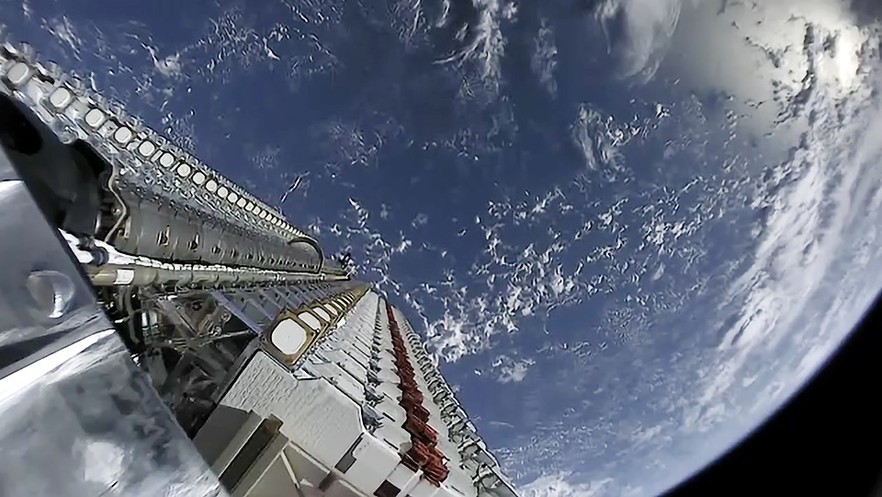Lesotho under pressure to approve Starlink licence
Prime Minister says his government is removing obstacles to US investment, including Starlink, in the wake of the tariff hike
Batch of Starlink test satellites stacked atop a Falcon 9 rocket. Photo: Official SpaceX photos via Wikimedia (public domain)
Lesotho Prime Minister Samuel Matekane on Wednesday announced that his government is actively removing barriers for US companies to operate in the country — including satellite internet provider Starlink, a subsidiary of Elon Musk’s SpaceX, despite the local opposition to the project.
This follows an announcement in February by the Lesotho Communications Authority (LCA), confirming receipt of Starlink Lesotho application for a Network Services Licence. The company seeks to offer satellite internet services to businesses and the public across Lesotho.
But the bid has sparked strong local opposition. Vodacom Lesotho Managing Director Mohale Ralebitso raised concerns during an LCA public consultation, arguing that Starlink should establish local shareholding before receiving a licence. “Local involvement may foster partnerships with domestic businesses, thereby creating investment opportunities and ensuring broader economic inclusion,” said Ralebitso.
A local organisation, Advocates for the Supremacy of the Constitution, commonly known as Section Two, echoed those concerns in its formal submission to the LCA. “While Section Two recognises the potential benefits of expanded internet access, we respectfully oppose the issuance of this licence to Starlink due to the complete absence of local ownership in the company,” said Secretary General Tjatjapa Sekabi.
Sekabi pointed to existing telecom players as examples of how foreign investment can coexist with national interests. Econet Telecom Lesotho, he noted, is 70% owned by Econet Wireless Global, with the Government of Lesotho holding the remaining 30%. Vodacom Lesotho is 80% owned by the Vodacom Group, while the remaining 20% is held by the Sekha-Metsi Consortium, a group of local Basotho businesspeople and public figures.
By contrast, “Starlink Lesotho’s submitted documents indicate that all 1,000 shares are owned by Starlink Holdings Netherlands B.V., a foreign entity based in Amsterdam, with all registered directors being US citizens,” Sekabi said. “This leaves no room for Basotho ownership: neither through the government nor through private local entities.”
But Lesotho is under pressure from the United States.
On 2 April, US President Donald Trump imposed a 50% tariff on imports from Lesotho — the highest among all affected countries — threatening up to 12,000 jobs in factories that export to the US under the African Growth and Opportunity Act (AGOA). He later paused the 50% tariff for 90 days. But this still leaves in place a 10% tariff that came into effect on 5 April.
Prime Minister Matekane says his government has been lobbying for tariff relief and the reinstatement of development aid. At the Third Private-Public Dialogue National Conference held in Maseru, he positioned Starlink’s licence as part of broader efforts to attract US investment. “We are actively removing obstacles to US investment, addressing issues like Starlink, energy, and hospitality investment approvals,” Matekane said.
On the other hand, the LCA says it continues with its public consultations. Speaking to GroundUp, LCA Public Affairs Manager Mothepane Kotele said the authority had concluded its review of public comments and was now “engaging with those who contributed”.
Section Two applauded Matekane’s efforts to address the economic fallout from US tariffs but cautioned against linking those discussions to Starlink’s licence. “These tariffs are unrelated to Starlink’s application,” coordinator Kananelo Boloetse said in an interview with GroundUp.
“Opposition to Starlink stems solely from its 100% foreign ownership and its implications for national interests. If the government intends to approve the licence despite this, it should say so clearly and directly, rather than obscuring the issue behind the tariff debate.”
Boloetse also urged the government not to prioritise its relationship with the Trump administration at the expense of regional ties. “Lesotho’s economic reality shows that over 70% of our exports flow to South Africa, compared to less than 20% to the US,” he said. “Straining ties with South Africa to impress Trump or Musk could jeopardise the interests of Basotho. Section Two urges a balanced approach.”
He warned that South Africa has already rejected Starlink’s licence application over concerns about its foreign ownership. Approving the same licence in Lesotho, he argued, could strain diplomatic relations with Pretoria, especially if the move appears to be driven by attempts to appease Elon Musk and Donald Trump.
“Permitting Starlink here might enable South Africans to circumvent their own country’s regulations by accessing services through Lesotho, and this, we believe, could create tension with our neighbour,” Boloetse said.
He emphasised that if the government does choose to approve Starlink’s application, the decision must be made through a transparent, independent process that places national interest above foreign appeasement.
Support independent journalism
Donate using Payfast

Don't miss out on the latest news
We respect your privacy, and promise we won't spam you.
© 2025 GroundUp. This article is licensed under a Creative Commons Attribution-NoDerivatives 4.0 International License.
You may republish this article, so long as you credit the authors and GroundUp, and do not change the text. Please include a link back to the original article.
We put an invisible pixel in the article so that we can count traffic to republishers. All analytics tools are solely on our servers. We do not give our logs to any third party. Logs are deleted after two weeks. We do not use any IP address identifying information except to count regional traffic. We are solely interested in counting hits, not tracking users. If you republish, please do not delete the invisible pixel.

